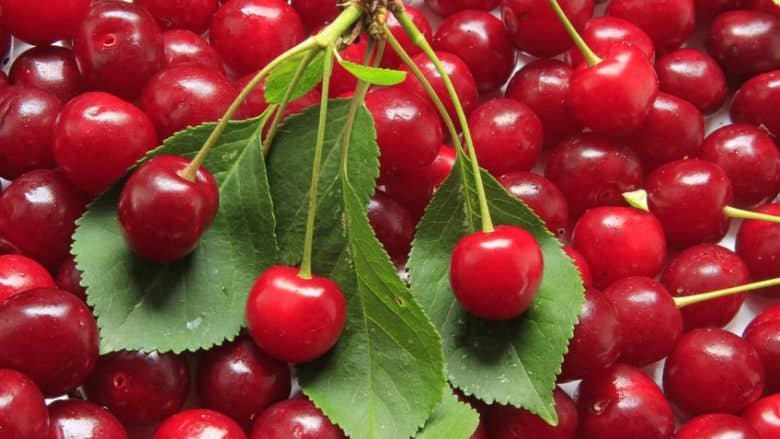
Tart cherries may be just what you’ve been looking for. They count as a healthy food, plus have surprising health benefits.
Cherries make a great snack that is packed with vitamins, minerals, and other nutrients. Plus, their low glycemic load (3) make them a desirable carbohydrate for weight control.
Further, scientists believe the anthocyanins found in cherries have anti-inflammatory properties and modulate oxidative stress.
Anthocyanins provide the blue, red, and purple colors seen in plants. Montmorency, a particular kind of cherries, has the highest anti-inflammatory content of any food.
The anti-inflammatory substance found in the peel of the fruit contains the same enzyme as over-the-counter anti-inflammatory drugs like ibuprofen, reports Oregon Health & Science University experts. They say:
To meet this need scientists conducted studies to determine the effectiveness of cherries in treating various conditions.
Studies Sampling
Chronic Inflammation
Eating a diet that included tart cherries over 90 days reduced abdominal fat, overall body inflammation, and inflammation at key sites (belly fat, heart) in a 2009 animal study published in the Journal of Medicinal Food.
A study of athletes who completed a 197-mile race that involved 1,000 eight to 12 person relay teams found that runners who consumed Montmorency cherry juice for a week before the race reported significantly less pain than runners who received placebo, reports Oregon Health and Science University researchers.
A study on the use of tart cherries to improve sleep quality was published in the 2011 European Journal of Nutrition. It involved 20 volunteers who were randomly assigned to drink tart cherry concentrate or a placebo over 7 days. During the study, a number of methods were used to assess sleep quality including participants’ melatonin levels.
The type of cherries used in the study, Montmorency, were reported to be high in melatonin. Melatonin is also a hormone produced in the brain.
The synthesis and release of melatonin are stimulated by darkness and suppressed by light, suggesting involvement in circadian rhythm.
Several studies have suggested that taking melatonin may help sleep.
The study authors’ concluded:
James A. Duke reports on two studies in The Green Pharmacy Guide to Healing Foods. The first study showed that 10 women who ate 45 Bing cherries before breakfast each day had lower uric acid levels in their blood. Uric acid is a marker for gout.
A followup study involving 20 people who consumed 45 Bing cherries throughout the day for a month found that nitric oxide, C-reactive protein, and a marker for T-cell activation deceased by 18 to 25 percent (all 3 markers of inflammation).
Studies Sampling Summary
This sampling of studies suggest that cherries may help a number of health conditions. However, more studies are needed before scientists can make definite recommendations.
Yet, people have used cherries to prevent or reduce the pain of inflammatory conditions like these for many years. Some say they help and others say they didn’t notice a change.
Using foods like tart cherries to help these conditions is certainly worth a try. If they don’t completely help they may help you lower a dose of medication, making its side effects less likely.
Besides, they taste good and have many important nutrients.
Key Points
Cherries count as a healthy food, plus have surprising health benefits. Although studies show that they may help a number of inflammatory conditions and improve the quality of sleep, more studies are needed.
In the mean time enjoy some tart cherries, especially if you suffer with any of these conditions.
Sources and Resources
Duke, James, The Green Pharmacy Guide to Healing Foods: Proven Natural Remedies to Treat and Prevent More Than 80 Common Health Concerns(Rodalestore.com: Rodale, 2008).
Howatson G, Bell PG, Tallent J, Middleton B, McHugh MP, ellis J., “Effect of tart cherry juice (Prunus cerasus) on melatonin levels and enhanced sleep quality,” European Journal of Nutrition 2011 Oct 30.
Oregon Health and Science University, “Tart Cherry Juice Reduces Muscle Pain and Inflammation,” http://www.ohsu.edu/xd/about/news_events/news/2010/2010-07-07-tart-cherry-juice-r.cfm.
Scalbert, Augustin, Johnson, Ian T., Saltmarsh, Mike, “Dietary Polyphenols and Health: Proceedings of the 1st International Conference on Polyphenols, “Polyphenols: antioxidants and beyond,” 81, no. 1, American Journal of Clinical Nutrition, January 2005: 215S-217S.
Seeram NP, Momin RA, Nair MG, Bourguin LD, “Cyclooxygenase inhibitory and antioxidant cyanidin glycosides in cherries and Berries,” 8, No. 5, Phytomedicine, September 2001: 362-9.
Seymour, EM, et al., “Regular tart cherry intake alters abdominal adiposity, adipose gene transcription, and inflammation in obesity-prone rats fed a high fat diet,” 12, no.5, Journal of Medicinal Food, October 2009: 935-42.
